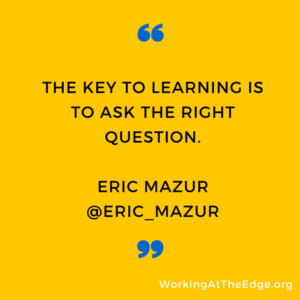 If you performed a search on this blog using the word inquiry, you’d notice that I use that word frequently. The most effective leaders are inquirers into their organizations and their practice. It’s critical for learning. As Harvard professor Eric Mazur once said, “The key to learning is to ask the right question.”
If you performed a search on this blog using the word inquiry, you’d notice that I use that word frequently. The most effective leaders are inquirers into their organizations and their practice. It’s critical for learning. As Harvard professor Eric Mazur once said, “The key to learning is to ask the right question.”
So how best to frame this journey of designing and/or curating questions to ask within our organizations? At the recent Building Learning Communities conference in Boston, Alan November reiterated that systems change is a result of changing processes. We’ve heard it before, but it’s not enough to just drop technology into a classroom and have the learning environment be transformed. November shared, “The real revolution is information and communication. Focus on what flows through the tech. Make the tech invisible.” As leaders, we need to lead inquiry that focus on the learning and ways the process of learning can be changed by this revolution in information and communication. Here are some powerful questions I’ve recently remixed/uncovered that I think might be useful in helping us focus on learning.
Edna Sackson shared a post, 10 Questions for Teacher Reflection. What if we tweaked these questions for principals and school leaders to look something like this?
- What are the most powerful learning experiences in your classrooms? Can you describe what makes them successful?
- What do you believe about how learning occurs? What are the conditions for powerful learning? Does the practice in your classrooms align with your beliefs?
- Who controls the learning in your classrooms? Do teachers seek compliance or do they foster student ownership? How do your teachers encourage learner agency? How can you foster the development of learner agency through teacher agency?
- What are you proud of as an instructional leader and what do you wish you could do better? How might you go about it? Who might support you?
- What do you wish you could change about your leadership, your classrooms, your school? What small steps could you take towards making it happen?
- What are your strengths? How might you develop them further? How might you use them to support your teachers?
- What can you learn from your teachers and your students? What works for them? Have you asked them? What might you change as a result?
- What excites you? What excites your teachers and your students? How might you make that part of your school culture?
- What do you dream of doing? How might you work towards that dream? Who might you share it with? What kind of support do you need?
- How do you learn best? What hinders your learning? How can this knowledge help you with future professional learning for your staff?
At that same Building Learning Communities conference, Alan November shared a terrific set of thoughtful questions from Clearing the Confusion Between Technology Rich and Innovation Poor: Six Questions. SAMR can be problematic because it focuses on technology. If we want to change processes we have to think about the learning, and the “transformational six” help us unpack what is really going on in an assignment/lesson. (Be sure to check out his post for a detailed explanation of each.)
- Did the assignment build capacity for critical thinking on the web?
- Did the assignment develop new lines of inquiry?
- Are there opportunities for students to make their thinking visible?
- Are there opportunities to broaden the perspective of the conversation with authentic audiences from around the world?
- Is there an opportunity for students to create a contribution (purposeful work)?
- Does the assignment demo “best in the world” examples of content and skill?
Might principals and school leaders use these questions to engage teachers in conversations around practice, observed lessons and/or classroom walkthroughs?
How would you modify these questions for your own leadership context? What additional questions might you ask to move closer toward your vision for learning?
Connect with Randy on Twitter and on the TLTalkRadio podcast!
Get new content delivered to your inbox and the ebook 3 Key Principles of Digital Transformation. The ebook contains valuable information from my experience leading a digital transformation and working with a variety of stakeholders over the past decade.
- A silver lining - January 22, 2022
- Is our use of tech working against us? 🤔 - September 8, 2021
- What’s NOT going to change in the next 10 years? 🤔 - September 7, 2021
[…] previously written about the idea of practitioner inquiry and am starting to see the intersection of powerful questions and deep work to elevate the […]